Samsung SSD 840 Pro (256GB) Review
by Anand Lal Shimpi on September 24, 2012 7:00 AM EST- Posted in
- Storage
- SSDs
- Samsung
- Samsung SSD 840
Random Read/Write Speed
The four corners of SSD performance are as follows: random read, random write, sequential read and sequential write speed. Random accesses are generally small in size, while sequential accesses tend to be larger and thus we have the four Iometer tests we use in all of our reviews.
Our first test writes 4KB in a completely random pattern over an 8GB space of the drive to simulate the sort of random access that you'd see on an OS drive (even this is more stressful than a normal desktop user would see). I perform three concurrent IOs and run the test for 3 minutes. The results reported are in average MB/s over the entire time. We use both standard pseudo randomly generated data for each write as well as fully random data to show you both the maximum and minimum performance offered by SandForce based drives in these tests. The average performance of SF drives will likely be somewhere in between the two values for each drive you see in the graphs. For an understanding of why this matters, read our original SandForce article.
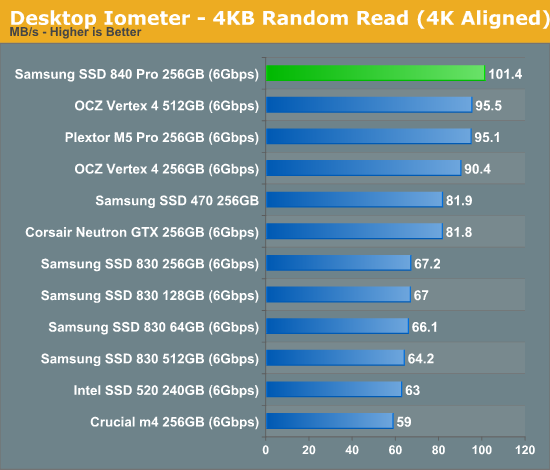
We have a new king, the 840 Pro manages to inch past the fastest Vertex 4 in our random read performance test.
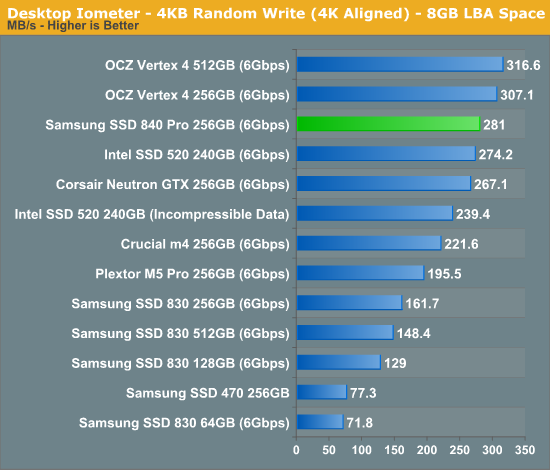
The low queue depth random write performance crown goes back to the Vertex 4, but the 840 Pro is around 75% faster than the old 830. Other than the Vertex 4, there's nothing faster than the 840 Pro here.
Many of you have asked for random write performance at higher queue depths. What I have below is our 4KB random write test performed at a queue depth of 32 instead of 3. While the vast majority of desktop usage models experience queue depths of 0 - 5, higher depths are possible in heavy I/O (and multi-user) workloads:
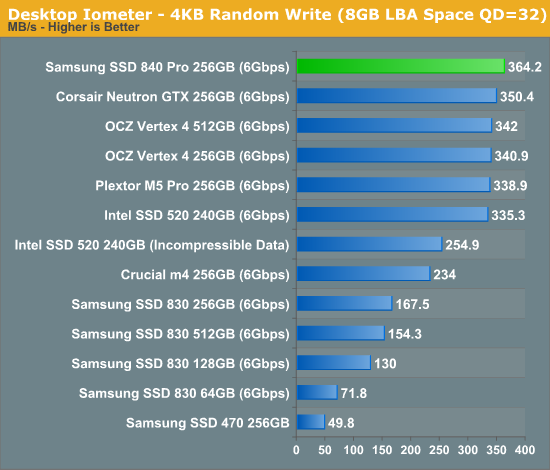
Ramp up queue depth and the 840 Pro manages to even outperform Corsair's new Neutron GTX.
Sequential Read/Write Speed
To measure sequential performance I ran a 1 minute long 128KB sequential test over the entire span of the drive at a queue depth of 1. The results reported are in average MB/s over the entire test length.
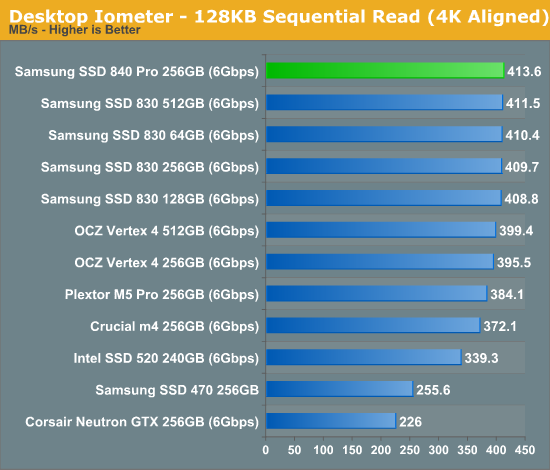
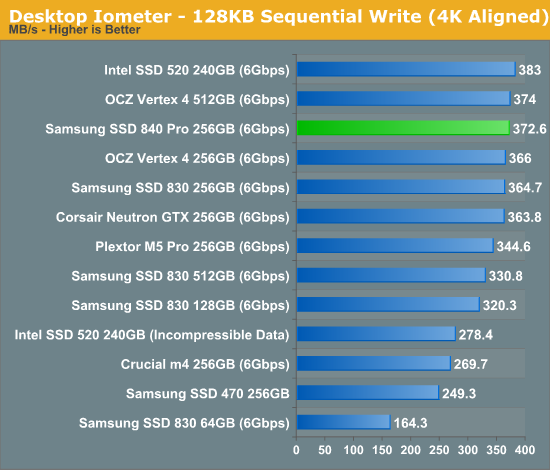
There are no tradeoffs here: excellent random IO performance and class leading low queue depth sequential performance. The 840 Pro is looking like a good all-around performer.
AS-SSD Incompressible Sequential Performance
The AS-SSD sequential benchmark uses incompressible data for all of its transfers. The result is a pretty big reduction in sequential write speed on SandForce based controllers.
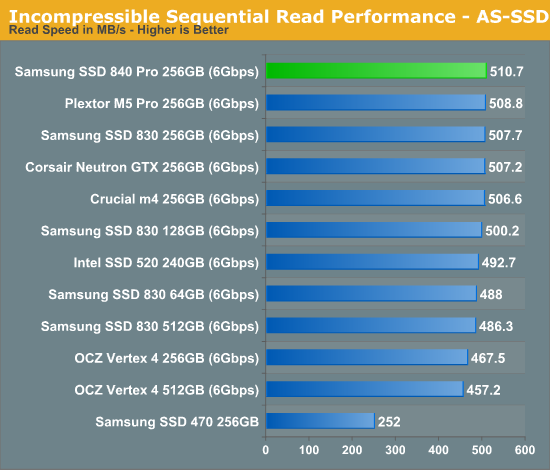
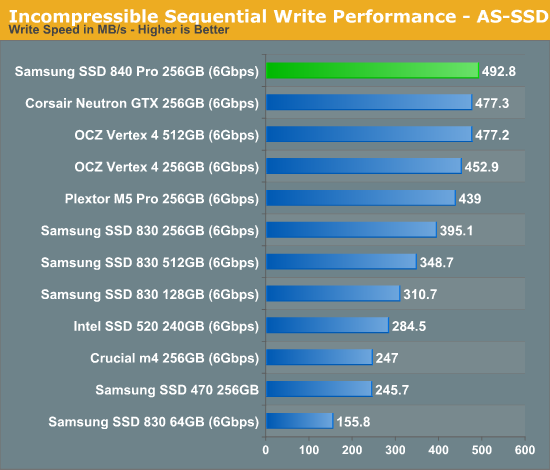
The 840 Pro lands on top once again in these higher queue depth sequential tests. The competition is hot on the heels of the 840 Pro however, we're limited by 6Gbps SATA here so expect continued clustering around 500MB/s going forward.










96 Comments
View All Comments
iwod - Tuesday, September 25, 2012 - link
True but i think there will be a bottleneck somewhere else once we hit certain number of Random Read. Anand already has results that any more then 40~50MB/s random wrote give us any more benefits. I think it would be similar for Random Read as well although we have so far not reach that point yet.Of coz these results are with today's software. Things could be different again when we reach that limit.
leboon - Monday, September 24, 2012 - link
Thanks for the review. I must say that the random comments interspersed throughout the article about the regular 840--which isn't even being reviewed-- seemed rather strange and out of place.On topic though, this new Samsung drive looks very promising and I'm looking forward to grabbing one of them when they're released, to breathe new life into an aging laptop.
Kristian Vättö - Monday, September 24, 2012 - link
That's because we didn't get any information about the regular 840 until a few hours before the NDA was lifted, but at least I feel like it was still important to note that such drive exists.There will be a review ASAP though. I just came back to my hotel room and found a gift box with a 250GB 840 in it :-)
nathanddrews - Monday, September 24, 2012 - link
"Joy!"-Stimpy
Grok42 - Monday, September 24, 2012 - link
Quit yammering and get to testing and writing! I'm guessing that is the 840 non-pro? Never mind, don't answer that, just focus.dishayu - Monday, September 24, 2012 - link
Active power : 0.068WSurely this has to be a mistake? I can't imagine any drive today with such low active power today.
DanNeely - Monday, September 24, 2012 - link
I'd like to know what Samsung's measuring for that number too; Anand measured the 840 pro an order of magnitude higher during write operations. Unless that number is just for the controller and not for the flash too there's something not right about the gap between that number and what AT's measuring.iwod - Monday, September 24, 2012 - link
I think that is only the controller. You have to include the LP-DDR2 as well.Its Working power is still higher then Intel. Although i dont like sammy, i hope the final product will be even better then this.
LGrill - Monday, September 24, 2012 - link
I was thinking the same thing.ssj3gohan - Monday, September 24, 2012 - link
This is completely correct. Anandtech and basically every other review site out there measures power consumption wrong: they measure it while *not* booted into an OS that supports SATA power management. With DIPM (device initiated power management) enabled, the drive should hit this power consumption easily.Same goes for pretty much every other SATA SSD these days. They're all well below 0.3W idle except for Sandforce drives. For instance, all Intel drives (intel- and marvell-based) are about 75 to 100mW idle.